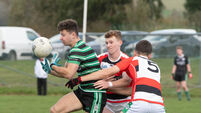Christy O'Connor on policing outside GAA managers and returning home with an extra edge

New Kerry football backroom team member and Austin Stacks supporter Kieran Donaghy at the county final. Picture: Brendan Moran/Sportsfile
When the news was announced last week that Jack O’Connor had added Kieran Donaghy to the Kerry management ticket for 2026, it was greeted in Kerry by a mix of delight and surprise – delight that it had happened, and surprise that it happened as soon as it did.
Having Donaghy on board is a huge boon to any set-up with his immense personality and popularity, combined with the breadth of his coaching acumen.
It seemed a no-brainer for O’Connor to get Donaghy on board once he departed the Armagh management. But it was still a call out of the blue in so many respects.
Still, many in the county felt that O’Connor would not do so this quickly because of a theory that Donaghy needed to serve some hard time outside the Kerry bubble before he was fully welcomed back into it.
That sounds ludicrous but it has merit. Why? Because some traditionalists and hardliners in the county feel it’s an act of disloyalty and even treason to be coaching or managing another team against Kerry.
It was all even more pointed again when the Armagh team that Donaghy coached beat Kerry in the 2024 All-Ireland semi-final after extra-time.
It was a similar theme when Henry Shefflin went to manage Galway for three years before getting involved with a Kilkenny team.
Shefflin wanted to manage at senior level but since the Kilkenny job wasn’t available, and the Galway job was, Shefflin went west.
Despite all he had done for Kilkenny as a player, Shefflin’s ambition and willingness to do things his way as a manager was weaponised against him by how it was portrayed in some corners in Kilkenny as complete disloyalty. Any residual bitterness and resentment towards Shefflin has long receded, but his move west cut so deep that there are still some jaundiced views on it around the county.
“Some people in Kilkenny still hold it against Henry for going to Galway,” said Shefflin’s former team-mate, Richie Power, recently. “And they’ll always hold it against him.”
Shefflin returned to manage Ballyhale to another county title this year before being repatriated into the Kilkenny system by being appointed county U20 manager.
Now that he is back, how much will Kilkenny benefit from Shefflin having already managed an elite senior inter-county team for three years? After five years immersed in Ulster football, how much value will Donaghy’s insight bring to Kerry going forward?
Shefflin and Donaghy are two of the most high-profile GAA players in history but those two examples provide neat case-studies in one of the most topical debates in the GAA at the moment – the role of the outside manager/coach.
Encouraging that practise of making clubs self-sufficient with regard to promoting and developing their own managers and coaches within five years is certainly a more realistic option than trying to enforce something that just won’t fly – especially in the short term.
If the seeds of this policy are to grow, the ground would need to be tilled first by a grace period.
“We’re looking at the concept that coach eligibility may, either in the short term or longer term, be linked to the same type of restrictions as player eligibility,” Micheál Martin, the GAA’s national games development committee chairman, said to John Fogarty in the ‘Irish Examiner’ last week.
“In other words, there will be some level of restriction on whether you could coach clubs that are not your own.”
That's something that the amateur status committee has explored where clubs with large membership would be the first to be required to adopt such a policy.
At the moment, the club coaching circuit is largely defined by the basic economic model of price determination – supply and demand.
And the demand usually outstrips the supply, which increases the propensity for the practise to become inflated. Some estimates suggest those costs in the club game run at around €10 million per annum.
Prohibiting coaches from working outside their own club and county will be a huge challenge, especially when it won’t remove the possibility of large sums of money continuing to change hands.
Trying to promote and develop enough coaches within a club to sustain self-sufficiency is an admirable target but it’s also highly unlikely to happen across the board, for a number of reasons.
With so many players and teams now used to elite practises and standards, having to stick with someone within the club who the players feel is not up to their required standard could be highly problematic and potentially divisive.
There is also the possible issue of restraining ambition and talent. What does a highly talented coach do, or where do they go, if the players within their club do not match their ambition through a lack of dedication, commitment or interest?
How does a coach with inter-county ambitions work their way up the ladder if they’re straitjacketed by a lack of enthusiasm, or numbers, within that club that doesn’t match their ambition? Could this lead to some coaches seeking a club transfer?
The GAA are right to want clubs to promote more of their own internal coaches. Yet this policy will need a significant grace period before all the creases can be ironed out.
And even at that, it’s unknown if those creases can be fully ironed out, or if some clubs will ever even want to fully bother doing so.










 App?
App?







